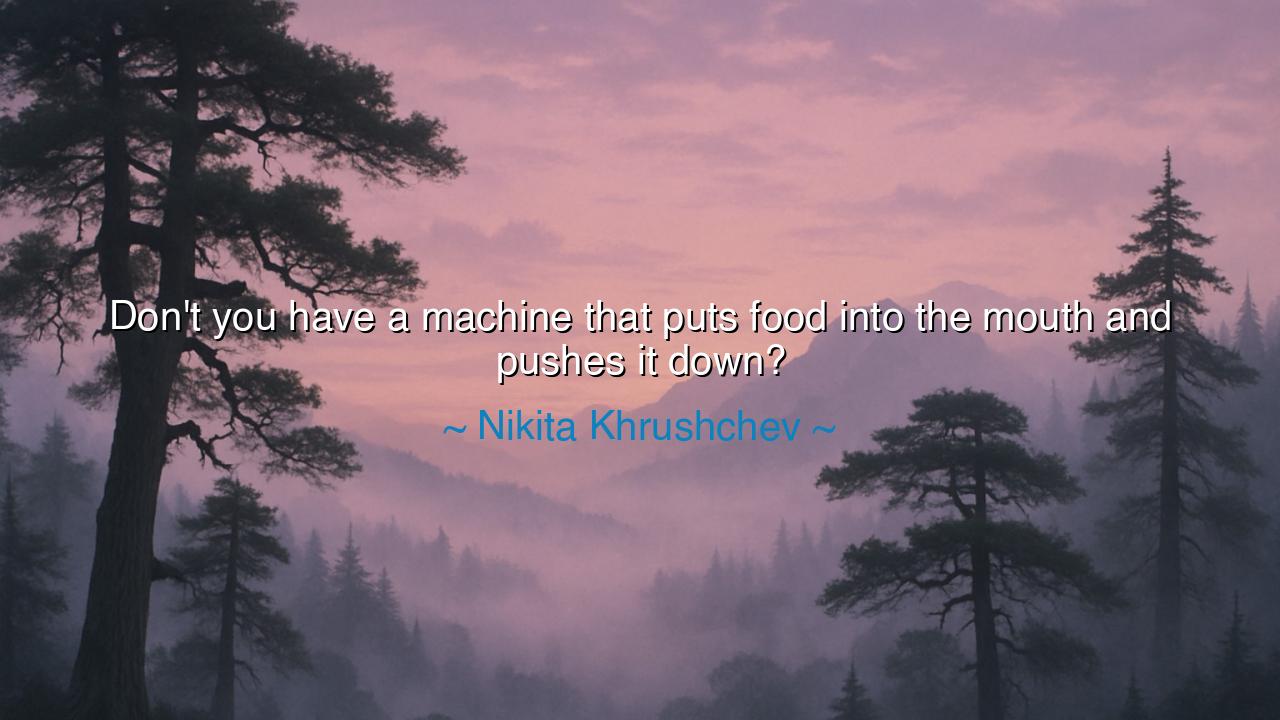
Don't you have a machine that puts food into the mouth and pushes






Host: The room is quiet, a slight hum of the evening filling the space as Jack and Jeeny sit across from one another, reflecting on Nikita Khrushchev's words: "Don't you have a machine that puts food into the mouth and pushes it down?" Jack, with a small grin, leans back in his chair, clearly amused by the quote, while Jeeny watches him, sensing that the quote carries more than just humor.
Jack: (with a chuckle, his voice light) "Khrushchev’s quote is hilarious, isn’t it? It sounds almost absurd—'a machine that puts food into the mouth and pushes it down'—but there’s something kind of unsettling about the way he’s asking it. It’s like he’s completely disconnected from the human experience of eating. There's no understanding of how basic it is to feed yourself, almost like he’s thinking of people as machines that can be fed like a car is fueled."
Jeeny: (smiling softly) "Yes, it’s definitely a comedic line, but it also reveals something about how disconnected people can get from simple human experiences. It’s as if he’s thinking about food purely as a mechanical process, something that can be automated, rather than appreciating the ritual or enjoyment that eating can bring. It shows a kind of detachment from the sensory experience of life."
Jack: (his voice thoughtful) "Right, and it also speaks to how we, as humans, sometimes try to find simplified solutions to complex problems. Food is essential to life, but he’s reducing it to something that can be handled by a machine. It’s almost like he's trying to remove the human element entirely from something so essential to our survival. It’s both a funny and disturbing way to look at something as basic as eating."
Jeeny: (nodding gently, her voice insightful) "Exactly. It’s almost like he’s trying to remove the joy, the connection, the community aspect of food—how we come together over meals, how we enjoy different flavors, and the conversations that happen around the table. His comment completely overlooks the cultural and emotional aspects of eating, reducing it to a mechanical process."
Host: The silence between them deepens as they reflect on the deeper meaning behind Khrushchev’s words. There’s a quiet understanding that while his comment is funny, it also reveals a certain detachment from the more human aspects of life. The room feels warmer now, as if their conversation has shifted into a deeper contemplation of what it means to be human in a world that sometimes values efficiency over connection.
Jack: (his voice softer, more reflective) "It’s funny how something as simple as eating can be turned into a machine-like process. It’s a reminder that there’s so much more to life than just getting things done. In the end, it’s the moments of connection—the act of sharing meals, of enjoying food together—that bring real meaning."
Jeeny: (with a gentle smile) "Exactly. Food isn’t just fuel. It’s a way to connect, to nourish more than just the body but also the soul. It’s about the experience of eating, the savoring, the ritual. It’s what makes it truly human."
Host: The conversation lingers, filled with a gentle warmth as both Jack and Jeeny reflect on the deeper implications of Khrushchev’s quote. What starts as a humorous remark about a machine to feed people becomes a reminder of the simple, human joys that we sometimes overlook in a world focused on efficiency. The room is still now, the soft light casting shadows as they both sit, quietly appreciating the moments of connection that bring richness to our lives.






AAdministratorAdministrator
Welcome, honored guests. Please leave a comment, we will respond soon